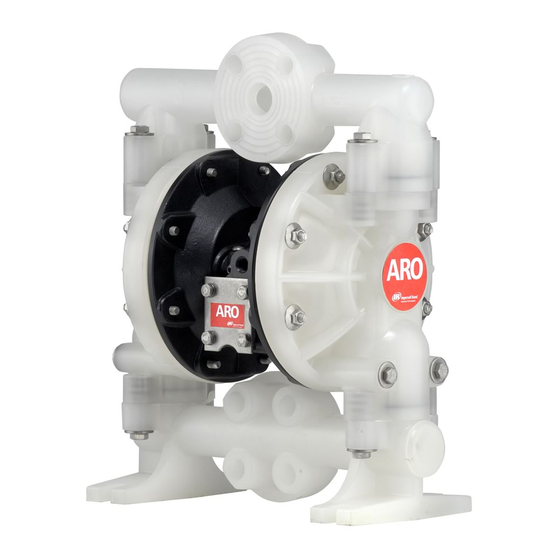ARO 6661XG-XXX-C Manual do operador - Página 3
Procurar online ou descarregar pdf Manual do operador para Bomba de água ARO 6661XG-XXX-C. ARO 6661XG-XXX-C 8 páginas. 1” diaphragm pump

AIR AND LUBE REQUIREMENTS
WARNING EXCESSIVE AIR PRESSURE. Can cause pump
damage, personal injury or property damage.
S
A filter capable of filtering out particles larger than 50 microns should
be used on the air supply. There is no lubrication required other than
the "O" ring lubricant which is applied during assembly or repair.
S
If lubricated air is present, make sure that is compatible with the Ni-
trile "O" rings in the air motor section of the pump.
OPERATING INSTRUCTIONS
S
Always flush the pump with a solvent compatible with the material
being pumped if the material being pumped is subject to ''setting up"
when not in use for a period of time.
S
Disconnect the air supply from the pump if it is to be inactive for a few
hours.
S
The outlet material volume is governed not only by the air supply but
also by the material supply available at the inlet. The material supply
tubing should not be too small or restrictive. Be sure not to use hose
which might collapse.
S
When the diaphragm pump is used in a forced-feed (flooded inlet)
situation it is recommended that a "Check Valve" be installed at the
air inlet.
S
Secure the diaphragm pump legs to a suitable surface to insure
against damage by vibration.
MAINTENANCE
Refer to the part views and descriptions as provided on page 4 through 7
for parts identification and Service Kit information.
S
Certain ARO "Smart Parts" are indicated which should be available
for fast repair and reduction of down time.
S
Service kits are divided to service two separate diaphragm pump
functions: 1. AIR SECTION, 2. FLUID SECTION. The FLUID SEC-
TION is divided further to match typical part MATERIAL OPTIONS.
S
Provide a clean work surface to protect sensitive internal moving
parts from contamination from dirt and foreign matter during service
disassembly and reassembly.
Air
Side
CROSS SECTION VIEW OF DIAPHRAGMS
(Refer to figure 3, page 5)
S Santoprene
6661AX-X-C
Fluid Side
Air Side
Fluid
Side
S Viton
are trademarks of the DuPont Company S Kynar
R
and Hytrel
R
is a trademark of the Monsanto Company, licensed to Advanced Elastomer Systems. L.P. S Key-Lube
R
MAINTENANCE CONTINUED
S
Keep good records of service activity and include pump in preven-
tive maintenance program.
S
Before disassembling empty captured material in the outlet manifold
by turning the pump upside down to drain material from the pump.
FLUID SECTION DISASSEMBLY
1. Remove top manifold(s).
2. Remove (22) balls, (19 and 33) "O" rings and (21) seats.
3. Remove (15) fluid caps.
NOTE: Only PTFE diaphragm models use a (7) primary diaphragm and
an (8) backup diaphragm. Refer to the auxiliary view in the Fluid Section
illustration.
4. Remove the (6) nut, (7) or (7 / 8) diaphragms and (5) washers.
5. Remove (3 and 4) "O" rings.
NOTE: Do not scratch or mar the surface of (1) diaphragm rod.
FLUID SECTION REASSEMBLY
S
Reassemble in reverse order.
S
Clean and inspect all parts. Replace worn or damaged parts with
new parts as required.
S
Lubricate (1) diaphragm rod and (2) "O" ring with Key-LubeR
grease.
S
Use ARO PN / 98930-T Bullet (installation tool) to aid in installation
of (2) "O" ring on (1) diaphragm rod.
S
Be certain (7) or (7 / 8) diaphragm(s) align properly with (15) fluid
caps before making final torque adjustments on bolt and nuts to
avoid twisting the diaphragm.
S
For models with PTFE diaphragms: Item (8) Santoprene diaphragm
is installed with the side marked "AIR SIDE" towards the pump cen-
ter body. Install the PTFE Diaphragm with the side marked "FLUID
SIDE" towards the fluid cap.
S
Re-check torque settings after pump has been re-started and run a
while.
3
5
7
2
Torque Sequence
(Refer to figure 3, page 5)
R
is a trademark of Penwalt Corp.
R
is a registered trademark of Key Industries
1
8
6
4
Figure 2
PAGE 3 OF 8
